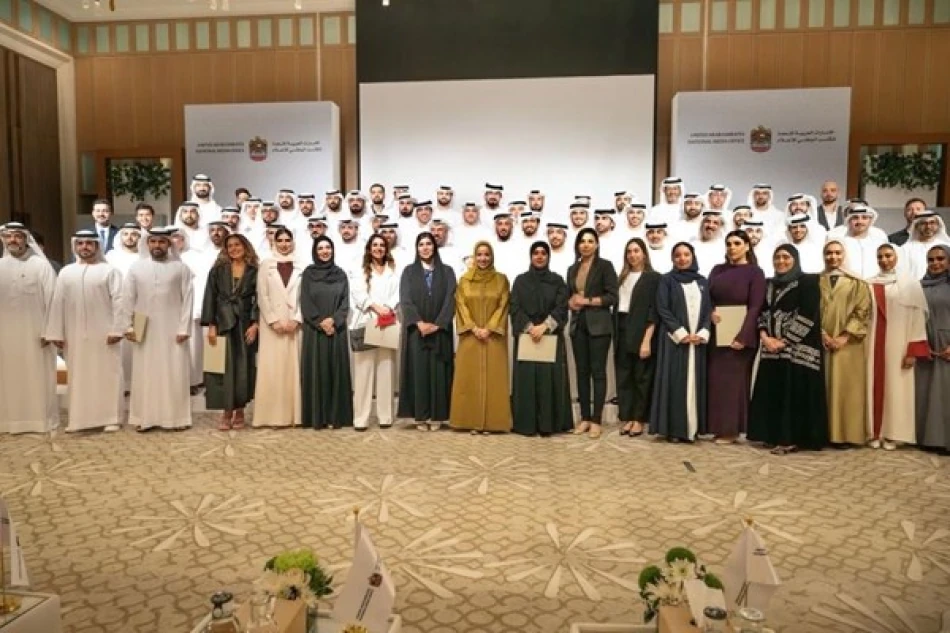
National Media Authority Honors Content Creators in Presence of Abdullah Al Hamed
UAE Launches National Content Creator Council to Combat Misinformation and Strengthen Digital Influence
The UAE has unveiled a new National Content Creator Council designed to unify the country's digital messaging and counter disinformation campaigns, as the Emirates positions itself as a regional leader in strategic communication. The announcement came during a high-profile ceremony honoring journalists and content creators who have elevated the UAE's international profile through their work.
Strategic Move to Consolidate Digital Influence
Abdullah bin Mohammed bin Butti Al Hamed, Chairman of the National Media Office and UAE Media Council, announced the council's formation as part of broader efforts to create a unified national narrative. The initiative represents a sophisticated approach to modern statecraft, where digital influence and narrative control have become as important as traditional diplomacy.
The timing is particularly significant as the UAE prepares to host the BRIDGE Summit in Abu Dhabi from December 8-10, positioning the country as a hub for media innovation and strategic communication in the Middle East.
Beyond Traditional Media Relations
Unlike conventional government media strategies, the National Content Creator Council targets the influencer economy directly. This approach acknowledges that content creators often wield more influence than traditional journalists, particularly among younger demographics who consume news primarily through social media platforms.
Dr. Jamal Mohammed Obaid Al Kaabi, Director General of the National Media Office, emphasized that the initiative goes beyond simple news coverage, aiming to "build societal awareness" and "instill values of belonging" in an era of competing narratives.
Regional Context and Global Implications
The UAE's move mirrors similar initiatives by other nations seeking to harness digital influence for strategic purposes. Singapore's coordinated approach to combating misinformation and China's sophisticated digital diplomacy efforts demonstrate how governments worldwide are adapting to the creator economy.
However, the UAE's approach appears more collaborative than regulatory, focusing on incentivizing aligned content rather than restricting opposing voices. This strategy aligns with the country's broader soft power ambitions as it seeks to position itself as a bridge between East and West.
Economic and Investment Angle
For the UAE's media and technology sectors, this initiative signals increased government investment in digital infrastructure and content creation capabilities. The emphasis on professional content creation could attract international media companies and digital platforms looking to establish regional headquarters.
The BRIDGE Summit itself represents an attempt to create a Dubai-style hub for media and content creation, potentially competing with established centers like Singapore and Hong Kong for regional influence.
Challenges and Strategic Considerations
The success of the National Content Creator Council will largely depend on its ability to maintain authenticity while advancing state objectives. Content creators who appear too closely aligned with government messaging risk losing credibility with their audiences, potentially undermining the initiative's effectiveness.
The council also faces the challenge of operating in an increasingly fragmented digital landscape where platforms like TikTok, Instagram, and emerging social networks each require different content strategies and audience approaches.
Measuring Success in the Digital Age
The UAE's investment in strategic communication reflects a broader understanding that national reputation and digital presence directly impact economic competitiveness. As the country diversifies away from oil dependence, its ability to attract international investment, tourism, and talent increasingly depends on effective narrative management.
The National Content Creator Council represents a significant evolution in how governments approach public diplomacy, potentially serving as a model for other nations seeking to leverage the creator economy for strategic advantage.
Most Viewed News

 Layla Al Mansoori
Layla Al Mansoori






